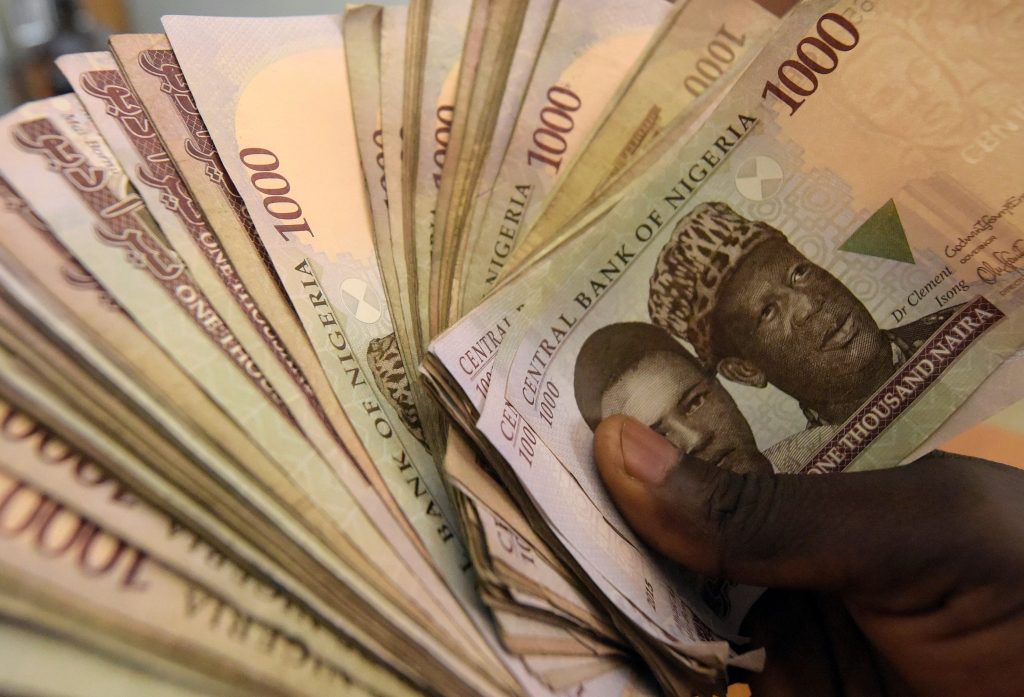Nigerian masses panic as value of Naira hits a new low

This picture taken on January 29, 2016 in Lagos shows 1000 naira banknotes, Nigeria's currency. Nigeria's central bank governor, Godwin Emefiele, on January 26 dismissed calls to devalue the naira in his monetary policy committee statement. Instead he chose to continue propping up the currency at 197-199 naira to the dollar and maintain foreign-exchange restrictions. As a result, the naira on the black market is hovering around a record low of 305, fuelling complaints from domestic and foreign businesses who can't access dollars required for imports. / AFP / PIUS UTOMI EKPEI (Photo credit should read PIUS UTOMI EKPEI/AFP/Getty Images)
More misery sets in for Nigerians as the naira plunges further into a seemingly never-ending spiral. The Nigerian naira has hit a new low, crashing to N530/$ and N722/£.
The naira whose exchange rate stood uneasily at N526/$ and N715/£ on Tuesday plummets even further as the cost of living rises ever higher for the masses.
This new development is a major setback and puts the majority of the country in greater distress as they barely can afford basic household items.
For a country with such vast natural resources, over 51 per cent of the Nigerian population are living in abject poverty and the country ranks high amongst the world’s poorest countries.
Food inflation was 21.03 per cent in July 2021 and the consumer price index stood at 17.38 per cent in the same month.
The Central Bank of Nigeria (CBN) has banned bureau de change (BDCs) for malpractices in the foreign exchange (FX) market, but their sanction has not stopped a free-fall of the naira.
The CBN website advertised the official dollar rate at N410.37 on Friday, but it is no more flying as only very few firms can access the market.
Nigeria imports virtually everything including toothpicks and tomatoes as its manufacturing sector continues to struggle.
Economist and Private Sector Analyst Muda Yusuf blamed the state of the FX market on the CBN’s reluctance to float the naira or allow it to be determined by the forces of demand and supply.
“The CBN’s current approach would continue to deepen distortions in the economy, perpetuate round-tripping, fuel speculation, suppress forex supply and boost underground economy,” Yusuf told The ICIR.
“What is happening in the foreign exchange market is a consequence of the CBN policy choice of a fixed exchange rate regime and administrative allocation of forex,” Yusuf said.
Director-General of the Manufacturers Association of Nigeria (MAN) Segun Ajayi-Kadir said the CBN must collapse various FX windows into a single official foreign window.
“We believe that a single FX window will eliminate the excesses of middlemen, save the value of the naira and allow for available FX to be allocated productively using the official banking protocols,” he said in an e-mailed statement to The ICIR.
President of the Lagos Chamber of Commerce and Industry (LCCI) Toki Mabogunje said in a recent statement mailed to The ICIR that unification of the FX market would improve the country’s currency management framework.
She noted that it would “also help the country to unlock external financing opportunities particularly from key multilateral institutions such as the World Bank and the IMF, who had for long advocated for a unified and flexible exchange rate system.”
She argued that unifying the FX market would also steer investor confidence in the Nigerian economy.
“Many investors are lamenting about the difficulties in accessing foreign exchange for the importation of raw materials, equipment and critical inputs for production and processing. The situation is taking a huge toll on capacity utilization, recovery and sustainability of businesses in the production sector.”
Manufacturers have argued that if more FX is allocated to the sector, rather than traders, they can produce, export and earn FX for the economy at this critical time.
Analysts say the Nigerian economy is not earning enough FX due to the slump in the oil market and low export of the non-oil sector.
The Punch found from Nigeria’s Foreign Trade Statistics published by the National Bureau of Statistics (NBS) that Africa’s most populous nation imported goods worth N40.9 trillion but exported only N4.22 trillion value of products between January 2017 and March 2021.
The ICIR also found that Nigeria’s non-oil exports have not exceeded $3 billion each year since 2013. Indonesia exports in 2020 were valued at $131 billion.
The manufacturing sector is stymied by poor access to FX and funding for expansion, poor infrastructure, high energy costs, and policy flip-flops.
Chairman of the MAN Export Group Ede Dafinone stressed the need to support non-oil exporters via the Export Expansion Grant (EEG), stating that the suspension of the scheme since 2013 was partly responsible for low dollar inflows into the Nigerian economy.

